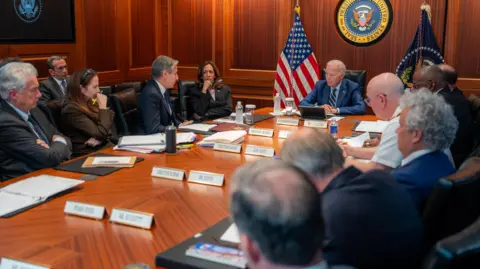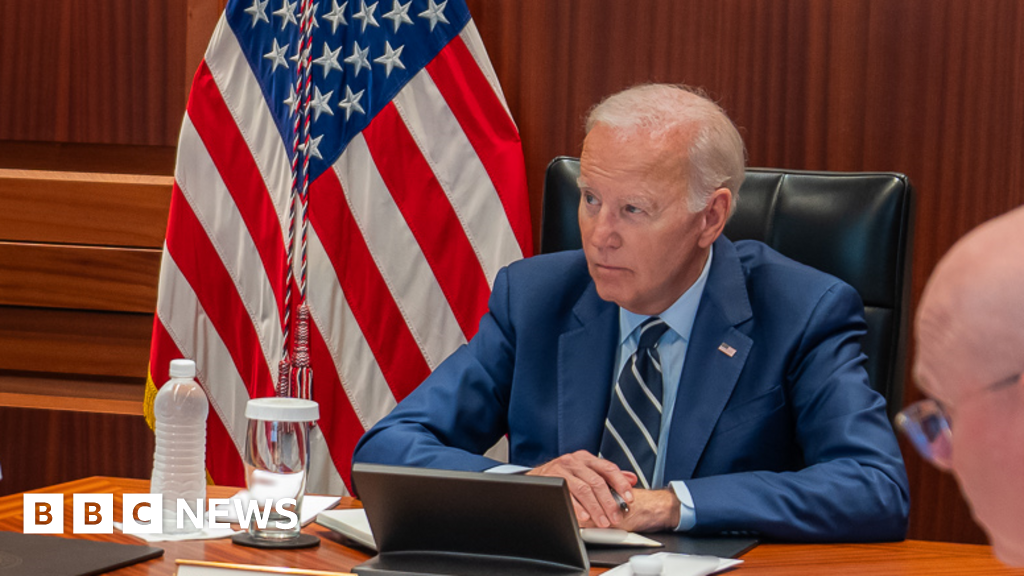 White House/ X
White House/ XUS President Joe Biden met his senior national security team on Monday as concerns of a possible Iranian retaliatory attack on Israel grew.
Mr Biden said he had been briefed on preparations to support Israel should it be attacked, while Secretary of State Antony Blinken said officials were working “around the clock” to prevent an escalation.
Tensions have risen over the last week following the assassination of Hamas’ political leader Ismail Haniyeh, for which Iran has blamed Israel and vowed “severe” retaliation. Israel has not claimed responsibility for the assassination.
Numerous countries, including the US and UK, have also told their citizens to leave Lebanon, from where it is feared Hezbollah, an Iran-backed militia and political movement, could play a role in any response.
During Monday’s briefing, Mr Biden was told the timing and nature of an Iranian attack remained unclear, according to US news site Axios. A day earlier, Mr Blinken reportedly told his G7 counterparts that Iran and Hezbollah could attack Israel within 24 to 48 hours.
In a statement released after the briefing, Mr Biden said: “We received updates on threats posed by Iran and its proxies, diplomatic efforts to de-escalate regional tensions, and preparations to support Israel should it be attacked again.”
He added that steps were being taken to respond to attacks on US forces “in a manner and place of our choosing”. On Monday, several US personnel were injured in a suspected rocket attack on a US military base in Iraq.
Speaking to reporters earlier in the day, Mr Blinken said officials were “engaged in intense diplomacy pretty much around the clock with a very simple message: All parties must refrain from escalation”.
“Escalation is not in anyone’s interests. It will only lead to more conflict, more violence, more insecurity,” he said.
He added that a ceasefire would “unlock possibilities for more enduring calm not only in Gaza itself, but in other areas where the conflict can spread”.
“It is urgent that all parties make the right choices in the hours and days ahead,” he said.
Earlier in the day, Mr Biden spoke to King Abdullah II of Jordan about “efforts to de-escalate regional tensions, including through an immediate ceasefire and hostage release deal”, a statement from the White House said.
A joint statement from the G7 also expressed “deep concern at the heightened level of tension in the Middle East which threatens to ignite a broader conflict in the region”.
“No country or nation stands to gain from a further escalation in the Middle East,” it said.
Talks that had brought renewed hope of a ceasefire deal to end the conflict in Gaza have faltered following the events of recent weeks.
On 27 July, 12 children and teenagers were killed in a strike on the Israeli-occupied Golan Heights. Israel accused Hezbollah of carrying out the strike, though Hezbollah denied any involvement.
Days later, Fuad Shukr, a senior Hezbollah military commander, was killed in an Israeli airstrike on a suburb of the Lebanese capital, Beirut. Four others, including two children, were also killed.
Hours later, Haniyeh was assassinated in Iran.
Iran’s Revolutionary Guard Corps (IRGC) said Haniyeh was killed in a “strong blast” caused by a “short-range projectile” fired from outside a house where he was staying while visiting the capital, Tehran.
Palestinian President Mahmoud Abbas said in an interview with Russian state news agency RIA Novosti that the killing would have a “negative impact on the ongoing negotiations”.
Israel has not commented on the assassination, but Israeli Prime Minister Benjamin Netanyahu said afterwards that Israel had delivered “crushing blows” to Iran’s proxy groups in recent days.
Following the killings in Lebanon and Iran, the IRGC said Israel would receive a “severe punishment at the appropriate time, place and manner”, while Hezbollah leader Hassan Nasrallah said the conflict had entered a “new phase”.
It is the closest the conflict has come to escalation since April, when Iran fired some 300 drones and missiles at Israel in response to an Israeli strike on an Iranian consulate in Syria that killed a number of senior military commanders.
Flights suspended
On Monday, Jordan asked all airlines planning to land at its airports to carry an additional 45 minutes’ worth of fuel, a move thought to be a precaution in case Jordan has to close its airspace in the event of a regional conflict.
German flag carrier Lufthansa has suspended all flights to Tel Aviv, Tehran, and Beirut until and including 12 August.
US airline Delta has also paused flights to Tel Aviv until at least 31 August “due to ongoing conflict in the region”.
The UK Foreign Office currently advises against all travel to Lebanon and has urged British citizens in the country to leave.
It also advises against all travel to the northern area of Israel that shares a border with Lebanon.
The conflict in Gaza began following the 7 October attack on Israel by Hamas and other militant groups, which saw around 1,200 people killed and another 251 taken back to Gaza as hostages.
Since the launch of Israel’s retaliatory ground invasion in Gaza, more than 39,600 Palestinians have been killed, according to the Hamas-run health ministry.
Hezbollah and Israeli forces have also exchanged near-daily attacks since the conflict began, with hundreds of people killed and thousands displaced on both sides of the Israel-Lebanon border.
Hezbollah and Hamas are both backed by Iran and form part of what Iran calls the “axis of resistance”, a loose alliance of militant and political groups across the region that oppose Israel and its key ally, the US.

